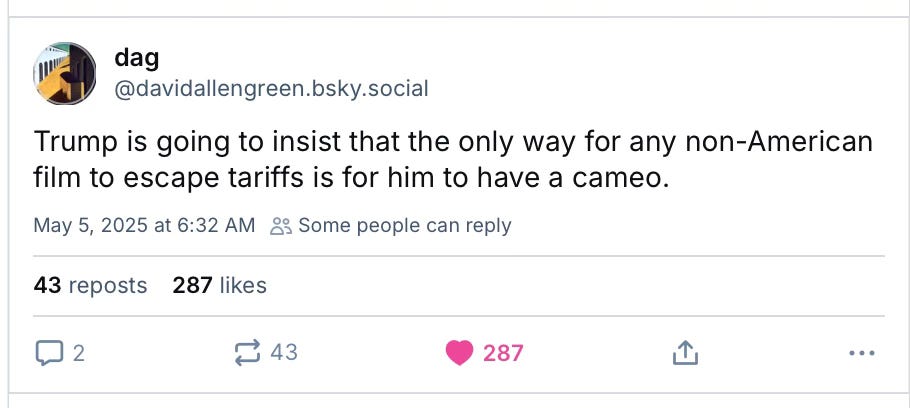Donald Trump is pointing at things and threatening to tariff them, again.
And while “tariffing foreign films” may have figured slightly lower on people’s predicted hit list, it probably shouldn’t have been.
Or to put it another way: Foreign countries provide tax incentivies to convince Hollywood to make films in their country rather than in the US.
Does that sound like something the Donald would instincitively like?
Over on Bluesky, Simon Lester, has also reminded everyone that the idea of tariffing films isn’t new: Back in 2007, when films were still (mostly) transported on physical film reel, videotapes or DVDs, the Film & Television Action Committee (FTAC) filed a Section 301 petition seeking an investigation into the legality of foreign government film and TV subsidies designed to attract American productions, with a focus on Canada.
Admittedly, tariffing web data is slightly more complicated than tariffing videotapes, so there may be some logistical issues associated with Trump’s 100% tariff threat.
But assuming he just might do something, I think it’s worth thinking about what that could actually look like.
Off the top of my head (and not accounting for whether any of these would be possible/legal under US law), here are things he could do that might have a similar impact:
Tariff associated goods. Assuming the main aim is actually to stop foreign countries from providing tax incentives and grants, he could just decided to apply a load of new tariffs on vaguely associated products (I dunno, stage curtains) until said countries stop granting the tax incentives and grants.
Tax foreign content. Look, this would be a complete mess but you could concenivably apply 100% tax to studios that produce >XX% of content outside of the US. Alternatively, you could apply 100% tax to the studio revenue linked to foreign production.
Ban foreign films. Does what it says on the tin.
Local content requirement. Similar vibe to some of the above, but you could require that for a film to be placed on the market in the US a certain proportion of its production/filming/etc be carried out in the US.
Cultural quotas. Time to get a bit more European. He could require that all cinemas, tv stations, streamers, etc, show American-produced films and shows XX% of the time.
Trump screen time. With a big hat tip to David Allen Green on Bluesky, this made me chuckle:
Or none of the above.
In essence, what I am saying is that people should treat this seriously and avoid the temptation to say “You can’t tariff a film, you IDIOT” because … he might just do that.
All together now …
Where are films from?
Staying on the topic of tariffing films, if the US were to tariff foreign films, and particularly if it were to apply different tariffs to films from different countries (e.g., France 100%, Japan 50%, etc.), we would need to think seriously about the origin of a film.
Long-term readers of MFN will know that I never miss an opportunity to write about rules of origin. Today is no different.
Now, when we discuss origin it is usually in relation to goods. Under both non-preferential (outside of a free trade agreement) and preferential (covered by a free trade agreement) regimes, there are rules dictating the ultimate origin of an imported product. Getting this right can be important, particularly if it is the difference between a, for example, 10 per cent tariff and a 145 per cent tariff.
But while no one ever really talks about it, knowing where a service is imported from can also be important. For example, via a country’s free trade agreements, some services providers from FTA countries might be able to bid for certain government contracts while other services providers from non-FTA countries might not.
Anyhow, the TL;DR is that this is an area where vibes run free.
From a US perspective, it’s worth looking at how the origin of other services has been determined, particularly in the context of procurement.
In particular, this Practice Law briefing highlights the US’s focus on where a foreign seller or contracter is either headquartered or established.
The briefing also provides this Cloud Computing case study:
Anyway, my guess if the film tariff is ever implemented is that there’s either some specific rules focused on labour hours or the like in the US vs outside the US or it just gets very vebsey very quickly.
Best,
Sam







Tax subtitles. All Movies in our Country should talk American.
Thanks for a considered article. Pretty much everything you've written would also apply to video games.. a far larger industry commercially but thankfully for them they didn't put a white lettered sign on a hill a century ago..